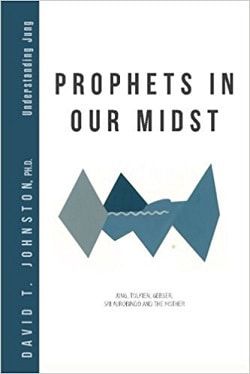![PROPHETS IN OUR MIDST: Jung, Tolkien, Gebser, Sri Aurobindo and the Mother [book review]](https://images.torial.com/9pvnCyQj8Oh1S0rYSdriUV7U0OE=/https%3A%2F%2Fwww.themindfulword.org%2Fwp-content%2Fuploads%2F2018%2F02%2Fbook-review-men-floating.jpg)
 PROPHETS IN OUR MIDST: Jung, Tolkien, Gebser, Sri Aurobindo and the Mother
PROPHETS IN OUR MIDST: Jung, Tolkien, Gebser, Sri Aurobindo and the MotherDavid T. Johnston
With a Ph.D. in Clinical Psychology, David T. Johnston is a practicing psychologist in Victoria, B.C. Also an artist, Dr. Johnston spent some time in India, where he was introduced to the teachings of Sri Aurobindo and the Mother’s Integral Yoga, and he also studied for a time at the C.G. Jung Institute in Switzerland.
Over the course of his many years of learning, practicing psychology and contemplative meditation, he wrote five essays inspired by the teachings and works of Jung, Tolkien, Gebser, Sri Aurobindo and the Mother, all of whom he considers modern-day prophets.
These essays were combined in his recent book, Prophets in Our Midst: Jung, Tolkien, Gebser, Sri Aurobindo and the Mother, which provides an interesting and extremely compelling case for society to embrace Individuation as a means of bringing about a more spiritually connected, harmonious and fulfilling future era.
The Age of Subjectivity and the way forward
Throughout the five essays contained in Prophets in Our Midst, Johnston outlines the theories of these modern-day prophets as they relate to society’s historical cycle of attachment to and detachment from a connection with a Higher Power. Supported by these theories, Johnston makes the case that we’ve moved away from the Age of Reason into the Age of Subjectivity.
This is to say that where society (as a whole) previously looked to science and rationality to make sense of life’s meaning, we’re currently in a phase in which—in Western culture—we believe in free will and moral choice, but have little conscious recognition of a greater cosmic order.
This state of being is ego-driven and self-centred, and devoid of a meaningful connection between our souls and a higher Will. To move forward both individually and as a society, we need to re-establish the link between the ego, the psyche and a Transcendent God, in order to balance out the one-sided, materially focused life we’re currently living.
According to the concepts outlined in Prophets in Our Midst, a whole and balanced life is qualitatively symbolized by the number four, representing the four pillars of consciousness: thinking, feeling, sensation and intuition. Our transition from a meaningless existence to conscious participation requires less ego-driven thinking, so that we can open ourselves to the experience of synchronicities (also known as meaningful coincidences), which bring the inner and outer worlds to a place of harmony where a higher Will is manifest.
An excerpt from the book, the below passage provides insight into the process of spiritual development that Dr. Johnston expands upon throughout:
Ideal for philosophical, open-minded readers
The concepts set forth in Johnston’s book are heady ones, and aren't for the closed-minded.
The essays read like academic dissertations with complex references and advanced semantics, so readers should prepare for a focused study session filled with many philosophical ideas requiring ample time to fully digest.
But the implications of the process of Individuation, with the goal of a more balanced spiritual existence for all of society, leaves me with great anticipation and a positive outlook for a future in which we’re more connected to a Transcendent God—regardless of how each of us may define such a Higher Power.
«RELATED READ» OMG! How Children See God »
image: pxhere
Read the full article
